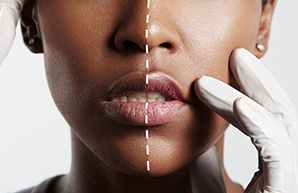Skin-lightening creams that contain hydroquinone were considered so dangerous that they were banned in SA in 1992. However, the use of skin-lightening creams is still more popular than we can imagine. Despite the negative reports, products that contain hydroquinone continue to be imported from India, Pakistan, America and the UK, and an estimated 35 percent of South African women use them in a quest for lighter, more even skin.
Aiming for perfection
Blemishes are usually the result of scarring from an injury or an acne condition, while dark patches can be caused by sun damage. On lighter skin types, they may appear as small brown patches of freckling that may grow darker over time.
On women with darker skin tones, they appear as small patches of ash-grey skin. Skin discolouration can also occur because of taking birth-control pills, pregnancy or illness, but in those cases it usually disappears over time. Regardless of the cause of their uneven skin tone, many women will try anything that promises to ‘get rid’ of blemishes in the quest to achieve a flawless skin.
Unfortunately, there is not enough being done to educate women on skincare and cosmetics, so some of them choose whatever cream promises to make blemishes ‘disappear’ without finding out about ingredients. Consequently, they end up using products that are ultimately harmful to the skin.
The hydroquinone trap
In some countries, hydroquinone is available over the counter in skincare preparations in concentrations of up to two percent. Most prescription-strength hydroquinone formulations contain up to four percent. These creams initially make the skin lighter, but they bleach the skin by breaking down melanin, destroying the skin’s protective layer in the process.
This results in burning, itching or blistering and extreme sun sensitivity (so your skin turns darker than before!). Other side effects can include severe acne, stretchmarks, thinner skin which bruises easily, blood blisters, dark red, brown or white spots and even loss of vision. Moreover, heavy metals such as mercury have been found in some skin-lightening soaps, which can result in disorders of the kidney.
Prolonged use of these damaging creams can result in your skin being unable to produce any melanin, leaving it unable to protect itself from the sun’s harmful rays, leaving you a high-risk candidate for skin cancer.
Sensible options
There are plenty of safe options for getting glowing, healthy skin with an even skin tone and less pigmentation, without using illegal skin lighteners.
Know your skin type
Have your skin analysed by a skincare professional to help you choose the correct products for your skin type.
Create a routine
Follow a skincare routine that includes cleansing, toning and moisturising twice a day, scrub your skin with an exfoliator and apply a mask once a week. Exfoliating is one of the most effective ways to minimise blemishes. Opt for skin-brightening products that use safe ingredients such as lemon essence, mulberry extract and tea tree oil, among other ingredients, to reduce the appearance of blemishes.
Block those UV rays
Apply sunblock with an SPF of at least 30 every morning on top of your moisturiser, even if it's cloudy.
Repair the damage
Use tissue oil every evening to encourage healing.
Eat for a glowing complexion
If pigmentation is a major concern for you, include foods such as avos, carrots and grapes in your diet to boost skin radiance.
Natural ingredients
The need to find an alternative to hydroquinone has led to research on depigmenting agents derived from natural ingredients. Active natural ingredients such as aloesin, soy extracts, vitamin C, kojic acid, licorice extract, melatonin, paper mulberry and retinol have been proven to be effective in reducing melanin transfer and minimising pigmentation, safely and effectively.
Pharmacy fact
If you have pigmentation that is caused by pregnancy, using the Pill or certain medicines or cosmetics, you should see the discoloration fade in a few months of giving birth, or discontinuing the medication or cosmetic. If you still have pigmentation, consult a skincare clinic for options such as peels, to even
out the skin tone.

